109 start with I start with I
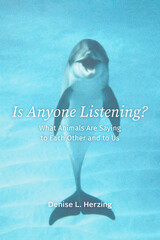
If you could pose one question to a dolphin, what would it be? And what might a dolphin ask you? For forty years, researcher and author Denise L. Herzing has investigated these and related questions of marine mammal communication. With the assistance of a friendly community of Atlantic spotted dolphins in the Bahamas, Herzing studies two-way communication between different dolphin species and between humans and dolphins using a variety of cutting-edge experiments. But the dolphins are not the only ones talking, and in this wide-ranging and accessible book, Herzing explores the astonishing realities of interspecies communication, a skill that humans currently lack.
Is Anyone Listening? connects research on dolphin communication to findings from Jane Goodall on chimpanzees, Dian Fossey on mountain gorillas, Cynthia Moss on African elephants, and others driving today’s exploration of possible animal languages. Although humans have long attempted to crack animal communication codes, only now do we have the advanced machine-learning tools to help. As Herzing reveals, researchers are finding fascinating hints of language in nonhuman species, including linguistic structures, vowel equivalents, and complex repeated sequences. By looking at the many ways animals use and manipulate signals, we see that we’ve only just begun to appreciate the diversity of animal intelligence and the complicated and subtle aspects of animal communication.
Considering dolphins and other nonhuman animals as colleagues instead of research subjects, Herzing asks us to meet animals as both speakers and listeners, as mutually curious beings, and to listen to what they are saying.

Islam is the religion of over one billion people and is practiced in virtually every country on earth. The articulation of an Islamic environmental ethic in contemporary terms is all the more urgent because Western-style conservation efforts do not fit all cultural and philosophical traditions.
This volume outlines the Islamic view of the cosmic order and reviews the ways an Islamic world view can be interpreted, reassessed, and applied to such environmental problems as pollution and water scarcity. Sections on social justice and on issues of sustainability and development look at the history and roots of the current environmental crisis; at the broader context of women's rights of equal access to both natural and social resources; and at the interconnectedness of environmental protection and the alleviation of human poverty.
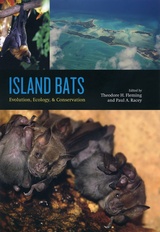
The second largest order of mammals, Chiroptera comprises more than one thousand species of bats. Because of their mobility, bats are often the only native mammals on isolated oceanic islands, where more than half of all bat species live. These island bats represent an evolutionarily distinctive and ecologically significant part of the earth’s biological diversity.
Island Bats is the first book to focus solely on the evolution, ecology, and conservation of bats living in the world’s island ecosystems. Among other topics, the contributors to this volume examine how the earth’s history has affected the evolution of island bats, investigate how bat populations are affected by volcanic eruptions and hurricanes, and explore the threat of extinction from human disturbance. Geographically diverse, the volume includes studies of the islands of the Caribbean, the Western Indian Ocean, Micronesia, Indonesia, the Philippines, and New Zealand.
With its wealth of information from long-term studies, Island Bats provides timely and valuable information about how this fauna has evolved and how it can be conserved.
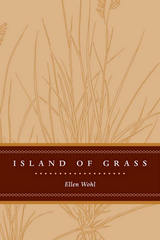
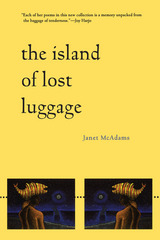
the disappeared, the lost children, the Earharts
of modern life. It's your bad luck to die in the cold
wars of certain nations. But in the line at Unclaimed
Baggage, no one mourns for the sorry world
that sent them here . . ."
The abused. The oppressed. The terrified victims of institutionalized insanity. Making daring connections between the personal and the political, Janet McAdams draws new lines in the conflict between the new and old worlds as she redefines the struggle to remain human.
This award-winning collection of poetry forges surprising links among seemingly unrelated forms of violence and resistance in today's world: war in Central America, abuses against Nature, the battleground of the bedroom. McAdams evokes the absurdity of everyday existence as she sends out a new call for social responsibility.
The Island of Lost Luggage is the poetry winner of the 1999 First Book Awards competition of the Native Writers' Circle of the Americas.
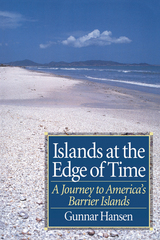
Islands at the Edge of Time is the story of one man's captivating journey along America's barrier islands from Boca Chica, Texas, to the Outer Banks of North Carolina. Weaving in and out along the coastlines of Texas, Louisiana, Mississippi, Alabama, South Carolina, and North Carolina, poet and naturalist Gunnar Hansen perceives barrier islands not as sand but as expressions in time of the processes that make them. Along the way he treats the reader to absorbing accounts of those who call these islands home -- their lives often lived in isolation and at the extreme edges of existence -- and examines how the culture and history of these people are shaped by the physical character of their surroundings.
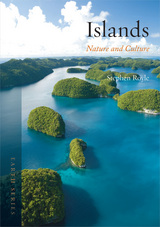
Royle shows that despite the view of some islands as earthly paradises, they are often beset by severe limitations in both resources and opportunities. Detailing the population loss many islands have faced in recent years, he considers how islanders have developed their homes into tourist destinations in order to combat economic instability. He also explores their exotic, otherworldly beauty and the ways they have provided both refuge and inspiration for artists, such as Paul Gauguin in Tahiti and George Orwell on the Scottish island of Jura. Filled with illustrations, Islands is a compelling and comprehensive survey of the geographical and cultural aspects of island life.

“The greenhouse effect is us, and it is specifically us in the Western world.” This is one of the messages at the beginning of Anita Gordon and David Suzuki’s startling view of our future on Earth. More than any other time in history, the 1990s have marked a turning point for human civilization. Not only are we facing ecological disasters that will affect our ability to survive, but the crisis is forcing us to reexamine the entire value system that has governed our lives for the past two thousand years.
Gordon and Suzuki warn us of the transition we will need to make if we are to arrive safely in the next century. More than a book on the environment, this is a book about us as a species: our shortsightedness, our failure to read the warnings, our inability to grasp the significance of our actions-and the tough decisions we have to make in order to save ourselves.
The power of the book lies in the consensus of the many voices, those of scientists and other scholars, that speak through it. The components of our predicament—global warming, soil erosion, acid rain, species depletion, ozone damage, rainforest destruction, overpopulation—are quantified with authority. And never before has such a strong consensus been expressed in a single warning. The message we receive is that our actions are taking place in a political and economic world that demands radical change.
In an effort to counteract this blueprint for disaster, Gordon and Suzuki present a resounding rebuttal of technological optimism and the belief that continued economic growth is a prerequisite for environmental reform. The intellectual fog of sustainable development is incisively dispelled, and in its place the authors suggest practical contributions that individuals as well as governments can make toward creating a “conserver society.”

Revealing the surprisingly small number of companies that control many of the basic commodities we use in everyday life, It’s All for Sale confirms in specific detail that globalization has been accompanied by an extraordinary concentration of ownership. At the same time, it is about much more than what company has cornered the market in corn or diamonds. Corporations and captains of industry, wars and swindles, oppressors and the oppressed, empires and colonies, military might and commercial power, economic boom and bust—all these come alive in Ridgeway’s canny and arresting reporting about the global scramble for power and profit. It’s All for Sale is an invaluable source for researchers, activists, and all those concerned with globalization, corporate power, and the exploitation of individuals and the environment.
READERS
Browse our collection.
PUBLISHERS
See BiblioVault's publisher services.
STUDENT SERVICES
Files for college accessibility offices.
UChicago Accessibility Resources
home | accessibility | search | about | contact us
BiblioVault ® 2001 - 2024
The University of Chicago Press









